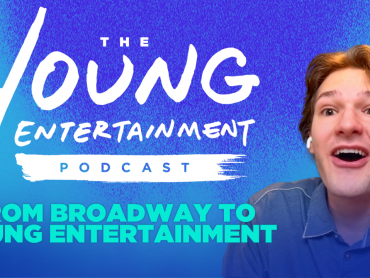Seven-time best-selling author Brian Solis released his new book “Life Scale: How To Live A More Creative, Productive, And Happy Life” via Wiley on March 6. In “Life Scale,” Solis teaches how to tackle the struggles of living in a world of constant digital distractions, and helps readers overcome the unforeseen consequences of living a digital life to break away from diversions, focus on what’s important, spark newfound creativity, and unlock new possibilities. Toggling between apps, networks, emails and texts comes at a tremendous cost to the actual productivity of a person’s life today. “Life Scale” provides readers the necessary tools to encourage friends and loved ones to become empowered, by breaking free from the bondage of device-addiction, multi-tasking, and the falsehoods of online validation. Check out our interview with Brian below!
Young Entertainment Mag: How did you first get involved in writing?
Brian Solis: I actually got involved with writing through music and my interest in music started early, at age 7. I always wanted to be a performer and an artist. I thought the way to do that was not just play guitar but to write music and words. Like most of us, at some point I realized I needed to get a real job that would afford a living and not just fun. Writing become a way of expressing the artist in me, but through the narrative of professional aspects of my life. I was writing about exploring the future of markets, of business. Initially, I contributed articles to magazines and websites.
Eventually, in 2004, I turned to blogging. Basically I did this so I could control my own platform and narrative and reach the audiences grappling with the same types of issues, chasing the same aspirations. Honestly, blogging changed my life! It opened up other worlds to me, including speaking opportunities. None of the eight books I’ve written or other future writing opportunities or speaking engagements would have happened without the attention I received for blogging.
YEM: Tell us about your new book, Lifescale.
Brian: Briefly, Lifescale: How to Live a More Creative, Productive, and Happy Life is a road map for learning to look up from our phones, to put technology and our modern compulsion to multitask in their place. The book offers basic exercises for regaining the capacity to focus for extended periods of time, and then digs deeper to explore priorities and values. Readers who complete all 12 chapters will have a renewed sense of purpose and appreciation for life. I think they’ll find true balance.
People of all ages struggle with the issues of distraction I cover in Lifescale, but research and my personal observations show that these problems are even worse for younger generations. I wrote Lifescale from the perspective of a father and someone who truly believes in the magic of youth, even into adulthood and old age. I’ve included a section about the inspiring genius of Walt Disney, both as a creator and problem-solver.
As a father in my 40s, and even though I work in Silicon Valley, I’m somewhere between the fully analog generation and the younger generation that has interacted with tech and social media all their lives. There’s a modern generation gap between the two groups.
I don’t believe older generations understand how much we’re affected by the technology that is also giving us the gifts of expression and connectedness. It offers a sense of engagement and empowerment that previous generations didn’t experience.
YEM: Where did the idea for this book come from?
Brian: For me, Lifescale evolved out of a realization that I had become a victim of all the technology I’d been studying for 20 years. I’d lost the capacity to focus for extended periods of time and do my best work. I was also damaging relationships with family and friends. So I had to fix my life.
I was working on a book proposal for a follow-up to my book X: The Experience When Business Meets Design and I just couldn’t focus. I realized I had a serious problem and gradually acknowledged that my constant distraction and inability to dig deep had been building up for years, not months. So, I Googled it, like anyone would. I found short-term solutions like yoga, meditations, and some apps, but nothing really addressed the larger issue. So, long story short, I decided to put the original project aside and spent a year researching and writing the book that become Lifescale. Now I’m working to turn the book into university curriculum and an ongoing Lifescaling movement.
YEM: This book is about how technology has taken over our lives? How do you think living in the technology age has affected people’s lives?
Brian: If we don’t actively manage it, we just get bombarded with distractions. We’ve become addicted to devices, to our phones. And a lot of it isn’t our fault. The people who design games, apps and social platforms are deliberately using techniques like one called ‘persuasive design’ to addict us. The term “stickiness” has a more sinister meaning. So much tech is designed to be addictive, to release dopamine and other chemicals into our brains. We end up craving our phones and laptops the way addicts crave opioids.
But I’m basically an optimist. I believe we’re living through the worst aspects of technology, but, in the coming years, things will improve. Society will grow to understand the addictive nature of tech and learn to manage it better. I’m also a realist. Doing a short-term digital detox can be great, but it’s not sustainable for most of us. I actually need my phone and other devices for my work. You probably do too. So we have to learn to manage tech, rather than have it manage us.
YEM: How has the digital age affected your life and your creativity?
Brian: I always make the point to say that the digital age has provided me with so many opportunities. I don’t like to just focus on the negative aspects because I see so many positives as well. So, during the period before I wrote this book, both my creativity and productivity were impacted in a negative way. I was settling for mediocrity, which I never would have done before. However, since doing the work to research, write and help design the layout of Lifescale, which I’m particularly proud of, I feel my creativity has not only returned but surpassed where it was before.
YEM: What would you recommend to people who feel consumed by their technology?
Brian: First, I’ve been there. I understand what they are going through. It was something I struggled with too. And I continue to struggle to some degree.
For people, especially young people, tech and social media have been part their lives from the beginning. So separating from it, or even just cutting back, is incredibly stressful. For people who are highly active on social media, who have a big following, for example, they have to accept that they’re not going to be as ‘popular’ as they once were.
I had the same challenge. I was active on many platforms and had to accept that if I was going to change my relationship with technology and truly focus on people and projects that mattered to me long-term, I had to be okay with not being the most popular person in the room or even being in the room at all. In today’s world that translates into not giving feedback every time someone posts something new online. I had to ask myself, ‘What’s the ROI?’ I had to learn that our time is a valuable currency. So I’d say, ask yourself ‘What’s the real benefit, the return on investment, of spending so much time on Facebook, Instagram, WhatsApp, etc.?
A big challenge with this book isn’t necessarily reaching people who have already realized they have a problem, it’s making an impression on those who definitely do have a problem, but haven’t come to terms with it yet. There are 12 chapters in the book and, yes, 12 steps to living their best lives. There’s a quote I like to use, “If ignorance is bliss, then awareness is awakening.”
Once you know what’s happening, it’s your choice what to do about it. If you decide to do nothing, then you’ll probably become part of the problem. But if you decide to take steps to manage technology, you’ll become part of an army of people who are serving as role models and living their best lives.
YEM: Do you feel that technology is fully negative? Is there a positive aspect to having so much technology?
Brian: There’s a huge upside to technology, and I’m certainly not abandoning tech. It’s an important part of my life and it helps bring people together. However, I am being much more mindful of how I’m using it. I make it a point to focus on what I’m trying to achieve when I’m interacting with tech.
I’ve been emphasizing the benefits of technology for 20 years. Today, I still think many of the things I thought two decades ago. Technology makes society more capable and more productive. That promise is still there.
A major problem is that none of this came with instructions. It’s like someone said, ‘Here are the keys to the kingdom, have at it.’ We got drunk on it. The same promise that gives us hope to solve climate change with tech and to feed the hungry, gives us fake news and the fact that we’re arguing about vaccinations and whether the earth is flat.
YEM: How has writing this book changed your relationship with technology?
Brian: Researching and writing this book has inspired me to be more present and engaged both online and offline, and definitely more structured in how I use my time. I also believe technology is now something I choose to use; I’m not compulsively checking my phone or social media anymore. My relationship with tech is much more productive and conscious than it was a few years ago. That’s the message of Lifescale. It’s a balance I’d like to help everyone achieve.
To purchase Life Scale, visit https://lifescaling.me/.





